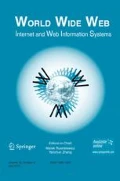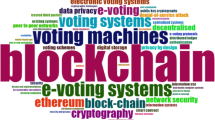Abstract
E-voting maybe replaces the traditional voting scheme in the future, however, the security threat must be paid enough attention. In this paper, a novel e-voting scheme is proposed using secret sharing and k-anonymity, which not only satisfies the basic security goals such as the non-cheating, the universal verifiability, the confidentiality, and the anonymity, but also achieves the addition properties including coercion-resistance and unconditional security since the security of the proposed scheme does not rely on any computational hard problem.


Similar content being viewed by others
References
Fujiwara, T.: Voting technology, political responsiveness, and infant health: evidence from Brazil. Econometrica. 83(2), 423–464 (2015)
Aggarwal, R., Saffi, P., Sturgess, J.: The role of institutional investors in voting: Evidence from the securities lending market. J. Financ. 70(5), 2309–2346 (2015)
Liaw, H.: A secure electronic voting protocol for general elections. Comput. Secur. 23(2), 107–119 (2004)
Chang, C., Lee, J.: An anonymous voting mechanism based on the key exchange protocol. Comput. Secur. 25(4), 307–314 (2006)
Chaum, D.: Untraceable electronic mail, return addresses and digital pseudonyms. Commun. ACM. 24(2), 84–90 (1981)
Cortier, V., Eigner, F., Kremer, S., et al.: Type-based verification of electronic voting protocols. POST2015. LNCS. 9036, 303–323 (2015)
Grewal, G., Ryan, M., Chen, L., et al.: Du-vote: remote electronic voting with untrusted computers. 2015 I.E. 28th Comput. Secur. Found. Symp. 155–169 (2015)
Ryan, P., Schneider, S., Teague, V.: End-to-end verifiability in voting systems, from theory to practice. IEEE Secur. Priv. 13(3), 59–62 (2015)
Cubric, M., Jefferies, A.: The benefits and challenges of large-scale deployment of electronic voting systems: university student views from across different subject groups. Comp. Educ. 87, 98–111 (2015)
Chun, T., Min, S., Chi, Y.: An electronic voting protocol with deniable authentication for mobile ad hoc networks. Comput. Commun. 31(10), 2534–2540 (2008)
Fan, C., Sun, W.: An efficient multi-receipt mechanism for uncoercible anonymous electronic voting. Math. Comput. Model. 48(9), 1661–1627 (2008)
Francesc, S., Josep, M., Miret, J., Jordi, P.: Simple and efficient hash-based verifiable mixing for remote electronic voting. Comput. Commun. 33(6), 667–675 (2010)
Abe, M.: Mix-networks on permutation networks. AsiaCrypt’99. LNCS. 1716, 258–273 (1999)
Jakobsson, M.: A practical mix. International Conference on the Theory and Applications of Cryptographic Techniques. EuroCrypt’98. LNCS. 1403, 448–461 (1998)
Park, C., Itoh, K., Kurosawa, K.: Efficient anonymous channel and all nothing election scheme. Workshop on the Theory and Application of Cryptographic Techniques. EuroCrypt’93. LNCS. 765, 248–259 (1993)
Sako, K., Kilian, J.: Receipt-free mix-type voting scheme. EuroCrypt’95. LNCS. 921, 393–403 (1995)
Benaloh J.: Verifiable secret-ballot elections. Yale University, Department of Computer Science, (1987)
Benaloh, J., Tuinstra, D.: Receipt-free secret-ballot elections. Proc. Twenty-Sixth Annu. ACM Symp. Theor. Comput. 544–553 (1994)
Cramer, R., Gennaro, R., Schoenmakers, B.: A secure and optimally efficient multi-authority election scheme. Eur. Trans. Telecommun. 8(5), 481–490 (1997)
Cohen J, Fischer M. A robust and verifiable cryptographically secure election scheme. Yale University. Department of Computer Science, (1985)
Hirt, M., Sako, K.: Efficient receipt-free voting based on homomorphic encryption. EuroCrypt’2000. LNCS. 1807, 539–556 (2000)
Lee, B., Kim, K.: Receipt-free electronic voting through collaboration of voter and honest verifier. Proc. JW-ISC2000. 101–108 (2000)
Malkhi, D., Margo, O., Pavlov, E.: E-voting without cryptography. FC’2002. LNCS. 2357, 1–15 (2002)
Neff, C.: A verifiable secret shuffle and its application to e-voting. CCS’01, ACM. 116–125 (2001)
Peng, K., Aditya, R., Boyd, C., et al.: Multiplicative homomorphic e-voting. IndroCrypt’2004. LNCS. 3348, 61–72 (2004)
Sako, K., Kilian, J.: Secure voting using partially compatible homomorphisms. Crypto’94. LNCS. 839, 411–424 (1994)
Camenisch, J., Piveteau, J., Stadler, M., et al.: Blind signatures based on the discrete logarithm problem. EuroCrypt’94. LNCS. 950, 428–432 (1994)
Chaum, D.: Blind signatures for untraceable payments. Crypto’82. 199–203 (1983)
Fujioka, A., Okamoto, T., Ohta, K.: A practical secret voting scheme for large scale elections. AusCrypt’92. LNCS. 718, 244–251 (1992)
Ibrahim, S., Kamat, M., Salleh, M., et al.: Secure e-voting with blind signature. NCTT. 2003, 193–197 (2003)
Okamoto, T.: Receipt-free electronic voting schemes for large scale elections. Security Protocols 1997. LNCS. 1361, 25–35 (1997)
Rivest, R.: A method for obtaining digital signatures and public-key cryptosystems. Commun. ACM. 21(2), 120–126 (1978)
Atreya, M., Paine, S., Hammond, B., et al.: Digital signatures. Osborne/McGraw-Hill, Berkeley (2002)
Chaum, D.: Secret-ballot receipts: true voter-verifiable elections. IEEE Secur. Priv. 2(1), 38–47 (2004)
Liu, J., Au, H., Susilo, W., et al.: Linkable ring signature with unconditional anonymity. IEEE Trans. Knowl. Data Eng. 26(1), 157–165 (2014)
Bohli, J., Müller-Quade, J., Röhrich, S.: Bingo voting: secure and coercion-free voting using a trusted random number generator. Vote-ID 2007. LNCS. 4896, 111–124 (2007)
Zhao, Q., Liu, Y.: E-voting scheme using secret sharing and K-anonymity. BWCCA. 2016, 893–900 (2016). https://doi.org/10.1007/978-3-319-49106-6_91
Shamir, A.: How to share a secret. Commun. ACM. 22(11), 612–613 (1979)
Blakley, G.: Safeguarding cryptographic keys. Proc. AFIPS’79 Nat. Comput. Conf. 48, 313–317 (1979)
Mashhadi, S., Dehkordi, M.: Two verifiable multi-secret sharing schemes based on non-homogeneous linear recursion and LFSR public-key cryptosystem. Inf. Sci. 294, 31–40 (2015)
Hadavi, M., Jalili, R., Damian, E., et al.: Security and search ability in secret sharing based data outsourcing. Int. J. Inf. Secur. 14(6), 513–529 (2015)
Harn, L., Lin, C., Li, Y.: Fair secret reconstruction in (t, n) secret sharing. J. Inf. Secur. Appl. 23, 1–7 (2015)
Song, Y., Li, Z., Li, Y., et al.: A new multi-use multi-secret sharing scheme based on the duals of minimal linear codes. Secur Commun. Netw. 8(2), 202–211 (2015)
Benelux, J.: Secret sharing homomorphism: keeping shares of a secret secret. Crypt’86. LNCS. 263, 251–260 (1986)
Kabir, M.E., Wang, H., Bertino, E.: Efficient systematic clustering method for k-anonymization. Acta Informatica. 48(1), 51–66 (2011)
Ciriani, V., Vimercati, S., Foresti, S., Samarati, P.: K-anonymity. Secure data management in decentralized systems. Springer US. 33, 323–353 (2007)
Zhang, Y., Chen, Q., Zhong, S.: Privacy-preserving data aggregation in mobile phone sensing. IEEE Trans. Inform. Forensics Secur. 11(5), 980–992 (2016)
Xu, R., Morozov, K., Takagi, T.: On cheater identifiable secret sharing schemes secure against rushing adversary. IWSEC’2013. LNCS. 8231, 258–271 (2013)
Lin, P.: Distributed secret sharing approach with cheater prevention based on QR code. IEEE Trans. Ind. Inform. 12(1), 384–392 (2016)
Chen, Z., Li, S., Zhu, Y., et al.: A cheater identifiable multi-secret sharing scheme based on the Chinese remainder theorem. Secur. Commun. Netw. 8(18), 3592–3601 (2015)
Acknowledgments
This work was partly supported by National Natural Science Foundation of China under grant No. 61662016, 61363069, Guangxi Key Laboratory of Trusted Software (kx201717), and Foundation of Guizhou Provincial Key Laboratory of Public Big Data.
Author information
Authors and Affiliations
Corresponding author
Rights and permissions
About this article
Cite this article
Liu, Y., Zhao, Q. E-voting scheme using secret sharing and K-anonymity. World Wide Web 22, 1657–1667 (2019). https://doi.org/10.1007/s11280-018-0575-0
Received:
Revised:
Accepted:
Published:
Issue Date:
DOI: https://doi.org/10.1007/s11280-018-0575-0




